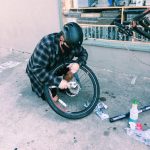Since we put out our statement of Solidarity with Black Lives Matter in June of 2020, BikeVentura has been having internal discussions about what it means to be an anti-racist organization, and prioritizing anti-racism and equity in all of our work. We want to see where we fit into the more broad movement for social justice and how we can serve that movement instead of it serving us. We want to make sure we aren’t reinforcing any systems that oppress people. We don’t want to take actions that perpetuate harm to the communities we serve, or communities we don’t serve. And we want to make sure the spaces that we create, such as this one that we are all sharing now, are safe and inclusive.
We should make no mistake and acknowledge that “traditional” bike advocacy has been a movement led by white people, and has reinforced systemic racism in the name of making it easier for white people to ride bikes. We have to understand that there’s much more to why a person feels safe or not safe riding a bike. More than paint on the road or a concrete barrier, the color of your skin dramatically changes how safe it is for you to ride a bike in America.
And we have to realize that we’re up against something systemic, going back centuries that’s weaved into every aspect of daily life. So how do we combat that with our bike advocacy?
I don’t have all the answers about how to do this. I need help and BikeVentura needs help to figure this out. We’ve hired a consultant to work with us and guide us through conversations and practices that will help us get on the path. I hope to include this group in one of those conversations. Our commitment is to seek these answers, to listen to communities marginalized by white supremacy and prioritize those voices in our advocacy work. What do we all love about biking? The feeling of freedom…and our advocacy will be about making sure everyone can enjoy that feeling.


